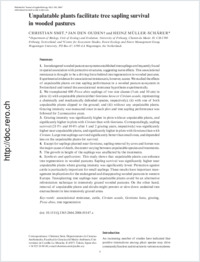Unpalatable plants facilitate tree sapling survival in wooded pastures
- Smit, Christian Department of Biology, Unit of Ecology and Evolution, University of Fribourg, Fribourg, Switzerland
- Den Ouden, Jan Centre for Ecosystem Studies, Forest Ecology and Forest Management Group, Wageningen University, the Netherlands
- Müller-Schärer, Heinz Department of Biology, Unit of Ecology and Evolution, University of Fribourg, Fribourg, Switzerland
-
2006
Published in:
- Journal of Applied Ecology. - 2006, vol. 43, no. 2, p. 305-312
English
1. In endangered wooded pasture ecosystems established tree saplings are frequently found in spatial association with protective structures, suggesting nurse effects. This associational resistance is thought to be a driving force behind tree regeneration in wooded pastures. Experimental evidence for associational resistance is, however, scarce. We studied the effects of unpalatable plants on tree sapling performance in a wooded pasture ecosystem in Switzerland and tested the associational resistance hypothesis experimentally. 2. We transplanted 600 Picea abies saplings of two size classes (5 cm and 10 cm) in plots: (i) with unpalatable plants (either Gentiana lutea or Cirsium acaule, representing a chemically and mechanically defended species, respectively); (ii) with one of both unpalatable plants clipped to the ground; and (iii) without any unpalatable plants. Grazing intensity was measured once in each plot and tree sapling performance was followed for 2 consecutive years. 3. Grazing intensity was significantly higher in plots without unpalatable plants, and significantly higher in plots with Cirsium than with Gentiana. Correspondingly, sapling survival (21·5% and 10·6% after 1 and 2 grazing years, respectively) was significantly higher near unpalatable plants, and significantly higher in plots with Gentiana than with Cirsium. Large tree saplings survived significantly better than small ones, and depended less on the unpalatable plants for survival. 4. Except for saplings planted near Gentiana, sapling removal by cows and horses was the major cause of death, the extent varying between unpalatable species and treatments. 5. The growth in height of the saplings was unaffected by the treatments. 6. Synthesis and applications. This study shows that unpalatable plants can enhance tree regeneration in wooded pastures. Sapling survival was significantly higher near unpalatable plants where grazing intensity was significantly lower. Protection against cattle is particularly important for small saplings. These results have important management implications for the endangered and disappearing wooded pastures in western Europe. Transplanting tree saplings near unpalatable plants could be an alternative reforestation technique in intensively grazed wooded pastures. On the other hand, removal of unpalatable plants and shrubs might prevent or slow down undesired tree encroachment in less intensively grazed areas.
- Faculty
- Faculté des sciences et de médecine
- Department
- Département de Biologie
- Language
-
- English
- Classification
- Biological sciences
- License
-
License undefined
- Identifiers
-
- RERO DOC 5799
- DOI 10.1111/j.1365-2664.2006.01147.x
- Persistent URL
- https://folia.unifr.ch/unifr/documents/300074
Statistics
Document views: 146
File downloads:
- Texte intégral: 330
